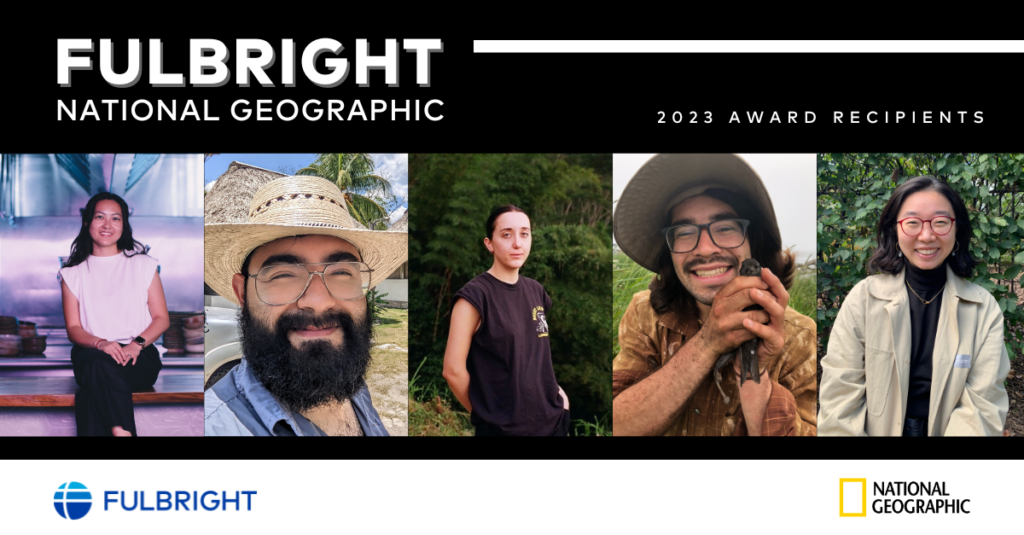
The 2023 Fulbright-National Geographic Award recipients were selected by the Fulbright Program and the National Geographic Society through a collaborative partnership. The award allows recipients to undertake in-depth explorations of pressing global issues over the course of an academic year.
These five Fulbright-National Geographic Award recipients have been named both Fulbrighters and National Geographic Explorers. The Fulbright-National Geographic Awards are highly selective. They are open to U.S. citizens who are selected as finalists for the Fulbright U.S. Student Study/Research Award. The Fulbright-National Geographic Award applicants propose complementary projects that merit up to $20,000 in additional funding, as well as training and mentorship, from the National Geographic Society. Those who are selected for the combined award have made compelling cases for their projects as meaningful forms of citizen diplomacy and global storytelling.
The National Geographic Society supports Fulbright projects of both global and local importance in the fields of conservation, research, storytelling, education, and technology. Previous recipients of Fulbright-National Geographic awards have pursued projects on women’s economic empowerment in hair braiding markets in Kenya, the vulnerability of fishing communities in Vietnam, the innovative culture of recycling in Taiwan, folktale traditions of Trinidad and Tobago, water resource management in South Africa, aquatic insect diversity in the Patagonia Ice Field in Chile, and the deaf community’s creation of a new sign language in Cambodia.
These award recipients plan to use a variety of research methods and storytelling tools to carry out their projects while receiving support and mentorship from National Geographic's global community of Explorers. The contributions of the Fulbright-National Geographic awardees will be documented through stories to be shared and amplified through Fulbright and National Geographic platforms.
The five Fulbright-National Geographic Award recipients for 2023 are:
Leonardo Calzada, a dual U.S.-Mexican citizen, biologist, and geographer. Caldaza is a Ph.D. student in the Geography Department of Rutgers University. He will undertake research in the Mayan Forest in Mexico where two ongoing projects — a reforestation program called “Sembrando Vida” (Sowing Life) and the construction of tourist train that will connect archeological sites throughout the forest — are concurrently being carried out. Calzada will use satellite imagery and engagement with farmers to study the long-term environmental and social impact of these plans.
Jenny Dorsey, a professional chef and social justice advocate in the food industry. Dorsey graduated from Harvard University’s Graduate School of Education with a master’s in public policy. Her Fulbright-National Geographic project will study the impact of the Singaporean government’s policies towards open-air centers and wet markets and how they have influenced business outcomes for vendors and food security for residents. Dorsey will use photo essays, interviews, and videos to create a multimedia project that will expand awareness of the changing dynamics of Singaporean food, people, tradition, and governmental policy. Her work will be included in the National University of Singapore’s permanent digital archives.
Rachel Herring, a member of the Choctaw Nation, researcher for the U.S. Department of Energy, and interdisciplinary creator. Herring received her master’s degree in international environmental policy from the Middlebury Institute of International Studies. She will research the genkai shūraku (marginalized rural communities) in Japan. Her research aims to contribute to clean energy policies that protect and integrate both traditional culture and Indigenous knowledge. Her investigation and storytelling aim to narrate what a just energy transition looks like for Japan’s aging population and the genkai shūraku – one that builds social resilience, lowers emissions, and preserves traditional culture.
Daun Lee, a sustainability consultant based in Boston, Massachusetts who received her B.A. in Anthropology from Washington University in St. Louis. Lee works toward equitable, holistic climate mitigation strategies. Lee will research the social impact of converting agricultural lands to solar farms on Jeju Island, South Korea, uncovering the cultural and heritage value disruptions which citrus farmers are facing due to the nation's greenhouse gas reduction goals. This research will provide insight into how to navigate future projects to ensure the longevity of important cultural values while progressing toward greenhouse gas reduction. Daun will share her findings through a journal article and short-form documentary film.
Jacob Ligorria, an ecologist studying seabirds, was selected by the Polish-U.S. Fulbright Commission to carry out research as part of an international team of scientists at the Polish Research Station in Hornsund fjord in Norway. Ligorria received a B.A. in Biology from Pomona College. He will investigate what adult seabirds called dovekies, or “little auks,” in the Arctic are feeding their chicks. By tracing where dovekies forage, his research will help clarify how climate change is influencing the entire Arctic food web. Ligorria will archive and analyze collected data, write a manuscript for a scientific paper, and publish weekly blog posts to communicate his research in the Arctic to inform research-based conservation programs and the public.
About the Fulbright Program
The Fulbright Program is the U.S. Department of State’s flagship international educational exchange program. Since its inception in 1946, the Fulbright Program has provided over 400,000 accomplished students, scholars, artists, and professionals of all backgrounds and fields the opportunity to study, teach, and conduct research, exchange ideas, and contribute to finding solutions to complex global challenges. The Fulbright-National Geographic Award was launched in 2013 and has supported nearly 50 Fulbright-National Geographic Awards to all world regions.
About National Geographic Society
The National Geographic Society is a global nonprofit organization that uses the power of science, exploration, education and storytelling to illuminate and protect the wonder of our world. Since 1888, National Geographic has pushed the boundaries of exploration, investing in bold people and transformative ideas, providing more than 15,000 grants for work across all seven continents, reaching 3 million students each year through education offerings, and engaging audiences around the globe through signature experiences, stories and content. To learn more, visit www.nationalgeographic.org.